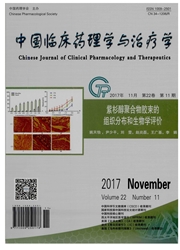

 中文摘要:
中文摘要:
目前关于药物反应个体差异研究集中在药物代谢和药物靶点基因的单核苷酸多态性位点(SNPs)和其他基因突变(例如拷贝数的变化)的表型效应,而仅分析DNA序列不能完全解释药物反应个体差异。miRNA的发现,为其提供了新的研究方向。miRNA是一类内源性的非编码小RNA,其与靶基因mRNA3啡翻译区(3’UTR)互补结合,引起mRNA切割或翻译抑制,从而在转录后水平下调基因表达。miRNA可负调控大量人类基因的表达,其中包括许多药物疗效相关基因。越来越多的研究结果表明,miRNA是导致药物反应个体差异的又一重要因素。本文从miRNA调控药物代谢、药物转运和药物靶点,miRNA及其结合位点多态性等方面对miRNA在药物反应个体差异中所起作用进行综述。
 英文摘要:
英文摘要:
The current focus of interindividu- al differences in drug response is primarily stud- ying on the phenotypic effects of SNPs and other genetic variations (such as copy number varia- tions) in drug-metabolizing and drug-target genes, which cannot fully explain the interindi- vidual variations in drug response, miRNAs are non-coding endogenous short RNAs which bind- ing to the 3'untranslated region (3"UTR) of its target gene and marking them for degradation and/or translation inhibition at the post- tran- scriptional level, miRNA can negative control a large human gene expression, including manypharmacokinetics and pharmaeodynamics genes, consequently, miRNA play very important roles in altered therapeutical efficacy. Expression lev- els of drug metabolism, drug transport and drug targets can be regulated by miRNA, miRNA and its binding site polymorphisms can influence gene expression, thus affecting drug response. In this review, we summarized the regulation of miRNA in drug therapy.
 同期刊论文项目
同期刊论文项目
 同项目期刊论文
同项目期刊论文
 Meta-analysis on pharmacogenetics of platinum-based chemotherapy in Non Small Cell Lung Cancer (NSCL
Meta-analysis on pharmacogenetics of platinum-based chemotherapy in Non Small Cell Lung Cancer (NSCL The A/G allele of eIF3a rs3740556 predicts platinum-based chemotherapy resistance in lung cancer pat
The A/G allele of eIF3a rs3740556 predicts platinum-based chemotherapy resistance in lung cancer pat Genetic polymorphism of copper transporter protein 1 is related to platinum resistance in Chinese no
Genetic polymorphism of copper transporter protein 1 is related to platinum resistance in Chinese no Association of Wnt-Inducible Signaling Pathway Protein 1 Genetic Polymorphisms With Lung Cancer Susc
Association of Wnt-Inducible Signaling Pathway Protein 1 Genetic Polymorphisms With Lung Cancer Susc Prediction of copper transport protein 1 (CTR1) genotype on severe cisplatin induced toxicity in non
Prediction of copper transport protein 1 (CTR1) genotype on severe cisplatin induced toxicity in non The ATP7B genetic polymorphisms predict clinical outcome to platinum-based chemotherapy in lung canc
The ATP7B genetic polymorphisms predict clinical outcome to platinum-based chemotherapy in lung canc 期刊信息
期刊信息
